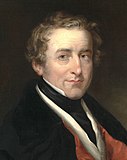
The 1852 United Kingdom general election was a watershed in the formation of the modern political parties of Britain. Following 1852, the Tory/Conservative party became, more completely, the party of the rural aristocracy, while the Whig/Liberal party became the party of the rising urban bourgeoisie in Britain. The results of the election were extremely close in terms of the numbers of seats won by the two main parties.

In the 1841 United Kingdom general election, there was a big swing as Sir Robert Peel's Conservatives took control of the House of Commons. Melbourne's Whigs had seen their support in the Commons erode over the previous years. Whilst Melbourne enjoyed the firm support of the young Queen Victoria, his ministry had seen increasing defeats in the Commons, culminating in the defeat of the government's budget in May 1841 by 36 votes, and by 1 vote in a 4 June 1841 vote of no confidence put forward by Peel. According to precedent, Melbourne's defeat required his resignation. However, the cabinet decided to ask for a dissolution, which was opposed by Melbourne personally, but he came to accept the wishes of the ministers. Melbourne requested the Queen dissolve Parliament, leading to an election. The Queen thus prorogued Parliament on 22 June.
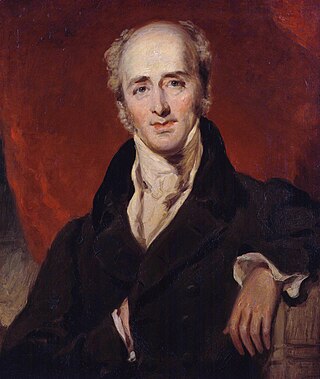
The 1832 United Kingdom general election, the first after the Reform Act, saw the Whigs win a large majority, with the Tories winning less than 30% of the vote.

Orkney and Shetland is a constituency of the House of Commons of the Parliament of the United Kingdom. It elects one Member of Parliament (MP) by the first past the post system of election. In the Scottish Parliament, Orkney and Shetland are separate constituencies. The constituency was historically known as Orkney and Zetland.
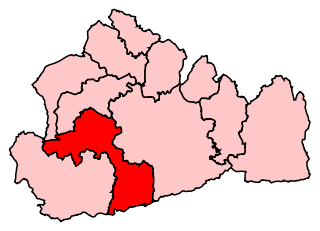
Guildford is a constituency in Surrey represented in the House of Commons of the UK Parliament since 2019 by Angela Richardson, a Conservative.

Windsor (/ˈwɪnzə/) is a constituency in Berkshire represented in the House of Commons of the UK Parliament since 2005 by Adam Afriyie of the Conservative Party. It was re-created for the 1997 general election after it was abolished following the 1970 general election and replaced by the Windsor and Maidenhead constituency.

The 1831 United Kingdom general election saw a landslide win by supporters of electoral reform, which was the major election issue. As a result, it was the last unreformed election, as the Parliament which resulted ensured the passage of the Reform Act 1832. Polling was held from 28 April to 1 June 1831. The Whigs won a majority of 136 over the Tories, which was as near to a landslide as the unreformed electoral system could deliver. As the Government obtained a dissolution of Parliament once the new electoral system had been enacted, the resulting Parliament was a short one and there was another election the following year. The election was the first since 1715 to see a victory by a party previously in minority.

The 1830 United Kingdom general election was triggered by the death of King George IV and produced the first parliament of the reign of his successor, King William IV. Fought in the aftermath of the Swing Riots, it saw electoral reform become a major election issue. Polling took place in July and August and the Tories won a plurality over the Whigs, but division among Tory MPs allowed Earl Grey to form an effective government and take the question of electoral reform to the country the following year.

The 1826 United Kingdom general election saw the Tories under the Earl of Liverpool win a substantial and increased majority over the Whigs. In Ireland, liberal Protestant candidates favouring Catholic emancipation, backed by the Catholic Association, achieved significant gains.
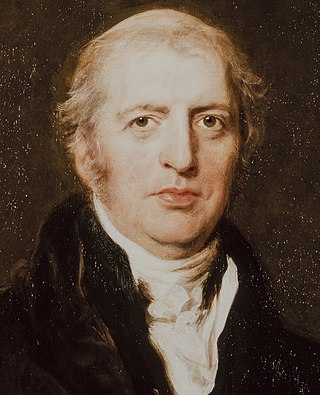
The 1820 United Kingdom general election was triggered by the death of King George III and produced the first parliament of the reign of his successor, King George IV. It was held shortly after the Radical War in Scotland and the Cato Street Conspiracy. In this atmosphere, the Tories under the Earl of Liverpool were able to win a substantial majority over the Whigs.
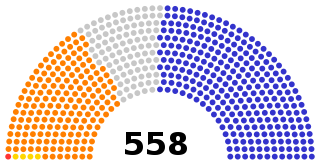
The 1818 United Kingdom general election saw the Whigs gain a few seats, but the Tories under the Earl of Liverpool retained a majority of around 90 seats. The Whigs were divided over their response to growing social unrest and the introduction of the Corn Laws.

The 1802 United Kingdom general election was the election to the House of Commons of the second Parliament of the United Kingdom. It was the first to be held after the Union of Great Britain and Ireland. The first Parliament had been composed of members of the former Parliaments of the Kingdom of Great Britain and the Kingdom of Ireland.
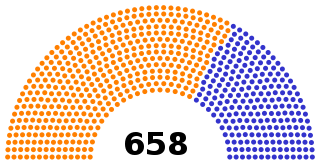
The 1806 United Kingdom general election was the election of members to the 3rd Parliament of the United Kingdom. This was the second general election to be held after the Union of Great Britain and Ireland.

The 1807 United Kingdom general election was the third general election to be held after the Union of Great Britain and Ireland.

The 1812 United Kingdom general election was the fourth general election to be held after the Union of Great Britain and Ireland.

There are five types of elections in the United Kingdom: elections to the House of Commons of the United Kingdom, elections to devolved parliaments and assemblies, local elections, mayoral elections, and police and crime commissioner elections. Within each of those categories, there may also be by-elections. Elections are held on Election Day, which is conventionally a Thursday, and under the provisions of the Dissolution and Calling of Parliament Act 2022 the timing of general elections can be held at the discretion of the prime minister during any five-year period. All other types of elections are held after fixed periods, though early elections to the devolved assemblies and parliaments can occur in certain situations. The five electoral systems used are: the single member plurality system (first-past-the-post), the multi-member plurality, the single transferable vote, the additional member system, and the supplementary vote.

A general election was held in the United Kingdom on 6 May 2010 and all 59 seats in Scotland were contested. The election result in Scotland was unusual in that there wasn't any change of seats from the 2005 general election, although the Labour Party took back two seats that it had lost in by-elections. This was the most recent general election at which the Labour Party won a majority of seats and plurality of votes in Scotland.

The Orkney and Shetland by-election was a Parliamentary by-election held on 18–19 November 1902. The constituency returned one Member of Parliament (MP) to the House of Commons of the United Kingdom, elected by the first past the post voting system.


